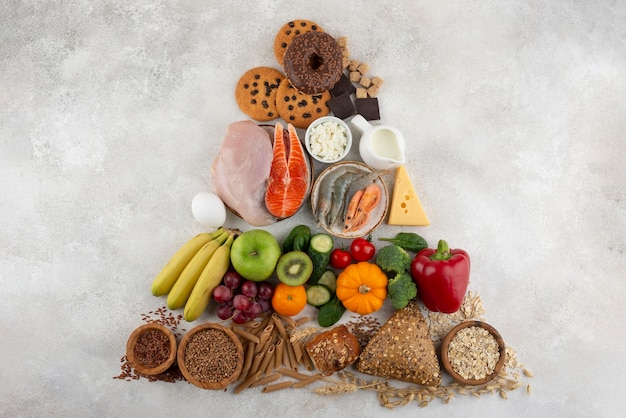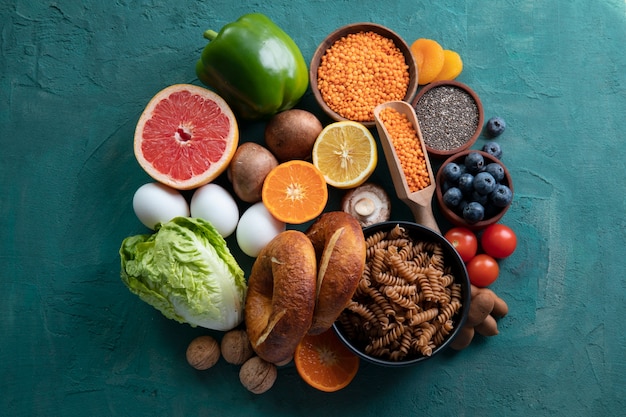BLOOD SUGAR CONTROL AND MANAGEMENT
VEGETABLES FOR DIABETICS
Vegetables are an essential part of a diabetic diet, providing vitamins, minerals, fiber, and antioxidants while being low in calories and carbohydrates.
Non-Starchy Vegetables
- Leafy Greens:
- Examples: Spinach, kale, Swiss chard, arugula, lettuce.
- Benefits: High in fiber, vitamins A, C, and K, and antioxidants.
- Impact on Blood Sugar: Very low in carbs, helping maintain stable blood sugar levels.
- Broccoli:
- Benefits: Rich in vitamins A and C, fiber, and sulforaphane, which may improve blood sugar control.
- Impact on Blood Sugar: Low GI, beneficial for blood sugar management.
- Cauliflower:
- Benefits: High in fiber, vitamins C and K, and folate.
- Impact on Blood Sugar: Low in carbs, helping prevent blood sugar spikes.
- Brussels Sprouts:
- Benefits: High in fiber, vitamins C and K, and antioxidants.
- Impact on Blood Sugar: Low GI, supports stable blood sugar levels.
- Bell Peppers:
- Benefits: High in vitamins A and C, fiber, and antioxidants.
- Impact on Blood Sugar: Low in carbs, with a low GI.
- Asparagus:
- Benefits: High in fiber, folate, and vitamins A, C, and K.
- Impact on Blood Sugar: Low GI, helps regulate blood sugar levels.
- Cucumbers:
- Benefits: Hydrating, low in calories, and a good source of vitamins K and C.
- Impact on Blood Sugar: Very low in carbs, suitable for blood sugar control.
- Tomatoes:
- Benefits: High in vitamins C and K, potassium, and lycopene.
- Impact on Blood Sugar: Low GI, beneficial for blood sugar management.
Starchy Vegetables (in Moderation)
- Sweet Potatoes:
Benefits: High in fiber, vitamins A and C, and potassium.
Impact on Blood Sugar: Moderate GI, better choice than regular potatoes.
- Carrots:
Benefits: High in fiber, beta-carotene, vitamins A and K.
Impact on Blood Sugar: Moderate GI, can be included in moderate amounts.
- Beets:
Benefits: Rich in fiber, folate, and antioxidants.
Impact on Blood Sugar: Moderate GI, can be included in moderation.
Cruciferous Vegetables
- Cabbage:
Benefits: High in fiber, vitamins C and K, and antioxidants.
Impact on Blood Sugar: Low GI, good for blood sugar control.
- Bok Choy:
Benefits: High in fiber, vitamins A, C, and K, and calcium.
Impact on Blood Sugar: Low GI, beneficial for managing blood sugar.
Other Notable Vegetables
- Zucchini:
Benefits: High in fiber, vitamins A and C, and low in calories.
Impact on Blood Sugar: Very low in carbs, helps maintain stable blood sugar levels.
- Eggplant:
Benefits: High in fiber, vitamins B1 and B6, and antioxidants.
Impact on Blood Sugar: Low GI, supports stable blood sugar levels.
- Green Beans:
Benefits: High in fiber, vitamins A, C, and K, and low in calories.
Impact on Blood Sugar: Low GI, beneficial for blood sugar management.
Tips for Including Vegetables in a Diabetic Diet
- Aim for Variety: Include a range of different colored vegetables to ensure a variety of nutrients.
- Focus on Non-Starchy Vegetables: These are lower in carbs and have less impact on blood sugar levels.
- Prepare Smartly: Steam, grill, roast, or eat raw to retain maximum nutrients and avoid adding extra fats or sugars.
- Portion Control for Starchy Vegetables: Enjoy starchy vegetables like sweet potatoes and carrots in moderation, keeping an eye on portion sizes.

